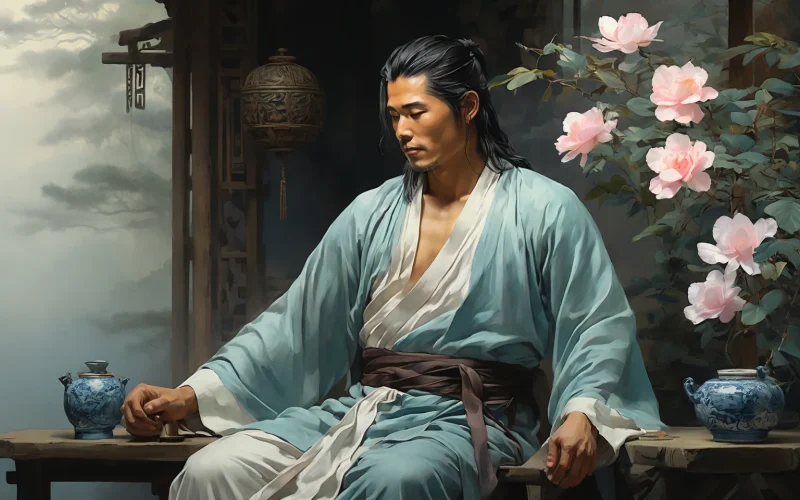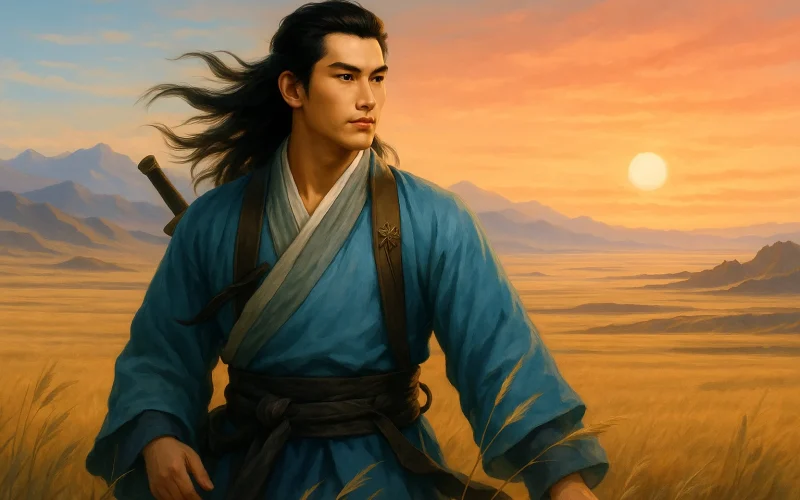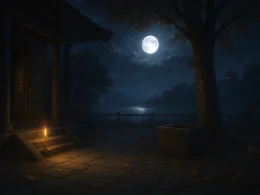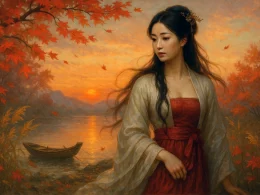O, mock not Lin Zong’s drenched and drooping hood!
The Rain God builds his fortress of despair.
Cold reeds lie still in veils of misty grey,
While gulls, surprised by autumn, skim the air.
The mountain’s strength seems spent, yet trails wind on;
The stream’s song fades—then swells in quiet grace.
With staff in hand, I’d roam where paths may lead,
As pleased as farmers beneath the rain’s embrace.
Original Poem
「雨作妨登山」
刘过
莫笑林宗折角巾,雨师坚壁助愁城。
菰蒲乍冷横烟淡,鸥路惊秋立水轻。
山势欲穷犹有路,溪流似断又闻声。
好怀聊拟携筇去,政惬农夫荷笠耕。
Interpretation
Liu Guo, a Southern Song patriot and advocate of vigorous, expansive poetry, likely composed this work during his later years of mountain reclusion. As life's pace slowed, his thoughts turned inward—transforming a thwarted mountain ascent into profound meditation on existence. The line "rain prevents climbing" captures a mundane inconvenience reframed through poetic wisdom, exemplifying how Song literati infused natural phenomena with life philosophy. Here, frustration yields to harmony with nature, revealing the poet's evolution from political anxiety to serene acceptance.
First Couplet: "莫笑林宗折角巾,雨师坚壁助愁城。"
Mò xiào Lín zōng zhé jiǎo jīn, yǔ shī jiān bì zhù chóu chéng.
Don't mock Lin Zong's crumpled hat—
Rain-god fortifies walls
around my sorrow's keep.
The poet invokes Tao Yuanming (林宗) through his iconic "crumpled hat" (折角巾), symbolizing unpretentious reclusion. "Rain-god fortifies walls" (雨师坚壁) militarizes weather's obstruction, humorously casting precipitation as a tactical adversary besieging the poet's melancholy. This paradoxical imagery—natural forces as both obstacle and muse—establishes the poem's contemplative tension.
Second Couplet: "菰蒲乍冷横烟淡,鸥路惊秋立水轻。"
Gū pú zhà lěng héng yān dàn, ōu lù jīng qiū lì shuǐ qīng.
Marsh plants chill abruptly
through horizontal mist—
gulls startle at autumn,
alighting lightly on water.
Sensory precision dominates here. "Horizontal mist" (横烟淡) spatializes atmosphere, while "startling gulls" (鸥路惊秋) personifies seasonal transition's disquiet. The couplet's thermal contrast ("chill abruptly" vs. "lightly") mirrors the poet's own oscillation between earthly discomfort and ethereal detachment.
Third Couplet: "山势欲穷犹有路,溪流似断又闻声。"
Shān shì yù qióng yóu yǒu lù, xī liú shì duàn yòu wén shēng.
Where mountain slopes
seem exhausted—
paths still wind;
where streams appear
cut off—
sounds still murmur.
This philosophical pivot transforms topography into existential metaphor. "Exhausted slopes" (山势欲穷) and "cut-off streams" (溪流似断) symbolize life's apparent dead ends, while "winding paths" (犹有路) and "murmuring sounds" (又闻声) affirm persistence's hidden possibilities. The couplet crystallizes Song resilience—finding hope in apparent hopelessness.
Fourth Couplet: "好怀聊拟携筇去,政惬农夫荷笠耕。"
Hǎo huái liáo nǐ xié qióng qù, zhèng qiè nóng fū hè lì gēng.
With light heart,
I'll take bamboo staff
and wander—
content as a farmer
hoeing fields,
rain-hat tilted.
The conclusion embraces pastoral simplicity. "Bamboo staff" (携筇去) evokes the classic recluse's toolkit, while the "tilted rain-hat" (荷笠耕) farmer embodies unpretentious fulfillment. This dual image reconciles intellectual refinement ("staff" as scholar's symbol) with agrarian authenticity, proposing a balanced ideal.
Holistic Appreciation
The poem choreographs a spiritual journey from obstruction to enlightenment. Initial meteorological resistance ("rain-god fortifies") yields to nature's subtle teachings—gulls marking seasonal change, obscured paths proving passable. The "exhausted slopes/murmuring streams" couplet operates as both topographic fact and metaphysical axiom, while the farmer's portrait offers resolution through integrated living.
Liu's genius lies in scaling cosmic insights from trivial setbacks. A canceled hike becomes a meditation on perseverance; marsh mist transforms into life's ephemeral veil. This alchemy of mundane into profound defines the Song poetic consciousness at its zenith.
Artistic Merits
- Meteorological metaphor
"Rain-god fortifies" (雨师坚壁) weaponizes weather into psychological siege imagery. - Avian semiotics
"Startling gulls" (鸥路惊秋) make birds barometers of seasonal and emotional shifts. - Topographic philosophy
"Exhausted slopes/winding paths" (山势欲穷犹有路) render landscape as life-instruction. - Agrarian archetype
The "tilted rain-hat" (荷笠耕) farmer embodies Confucian-Daoist synthesis in action.
Insights
Liu's poem teaches that obstacles often conceal curricula. His "rain-god" initially thwarts, then enlightens—suggesting that life's interruptions may be divine redirections. The "murmuring streams" remind us that apparent silence often harbors guidance, while the farmer's posture demonstrates how purposeful labor (耕) and mindful shelter (荷笠) combine for contentment.
For modern readers, this work resonates as an antidote to frustration culture. When algorithms demand constant progress, Liu's "exhausted slopes" validate rest as strategic pause rather than failure. His farmer, equally scholar and laborer, models integrating contemplation with action—a paradigm for our age of burnout.
Ultimately, the poem asserts that wisdom flows where willpower stalls. By surrendering to rain's lesson, the poet finds paths invisible to the hurried eye, hearing streams inaudible to the impatient ear. His real ascent isn't up the mountain, but into deeper seeing.
About the Poet
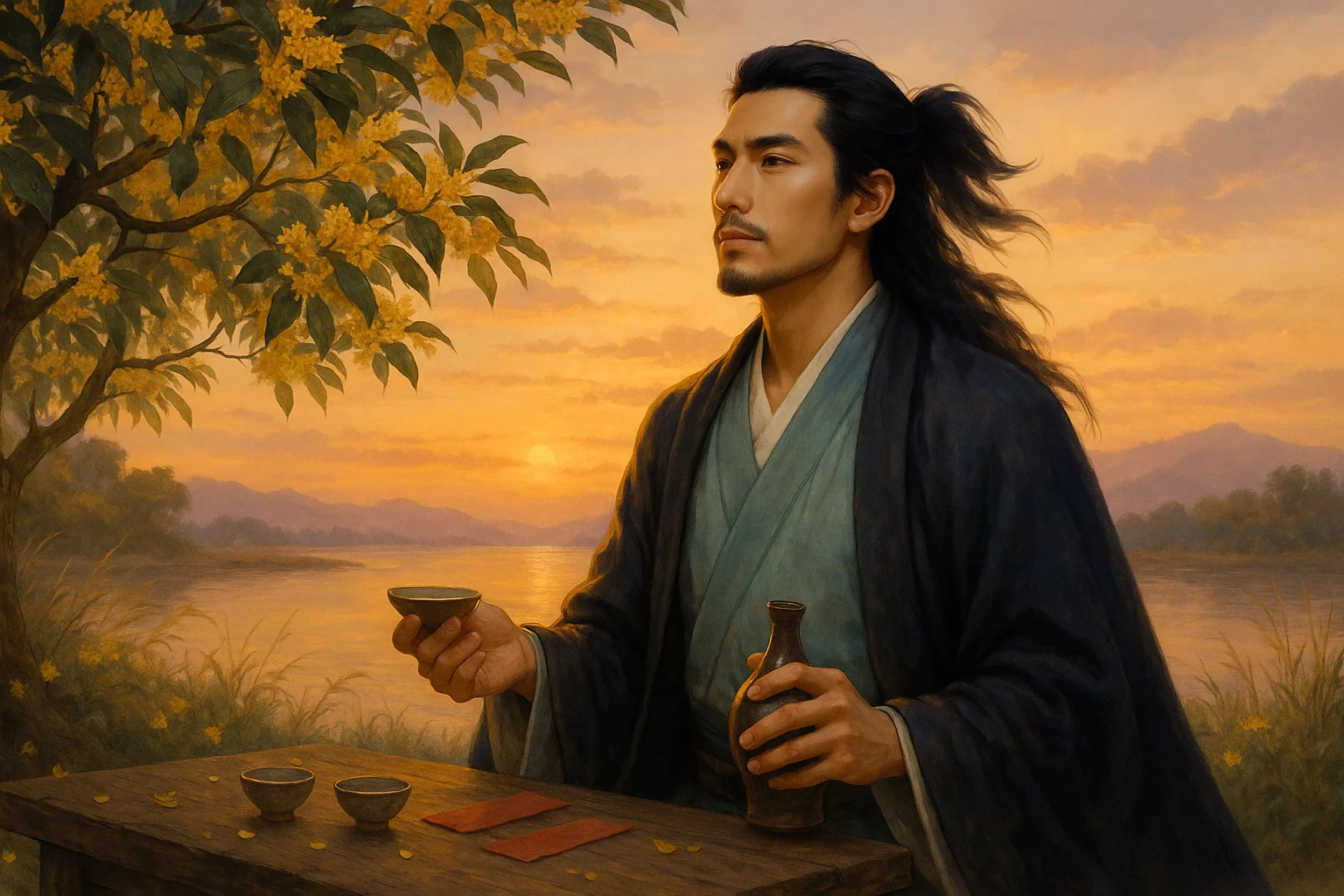
Liu Guo (刘过 1154 - 1206), a native of Taihe in Jiangxi, was a ci poet of the Bold and Unconstrained School (haofang pai) during the Southern Song Dynasty. Though he remained a commoner all his life, wandering the rivers and lakes, he associated with literary giants like Lu You and Xin Qiji. His ci poetry is impassioned and heroic, and his verse is vigorous and forceful. Stylistically close to Xin Qiji but even more unrestrained, Liu Guo became a central figure among Xin’s poetic followers.







